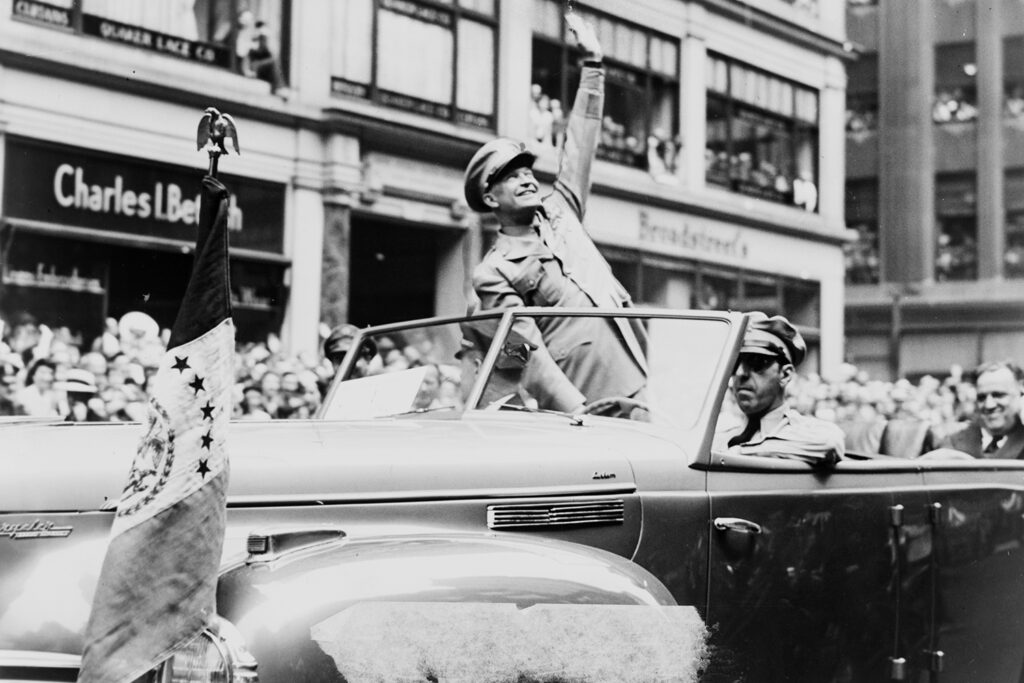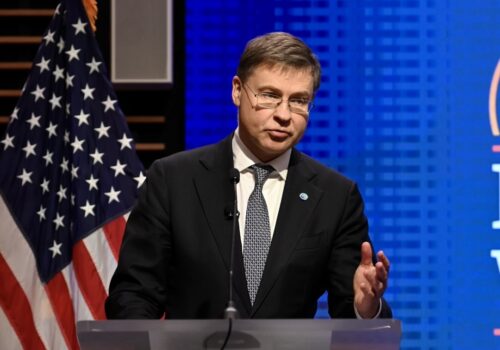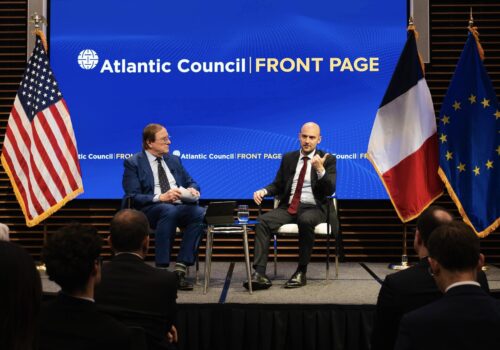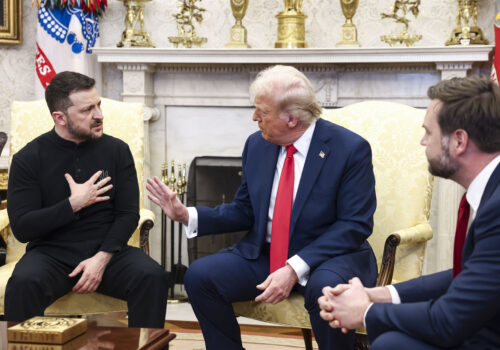Eighty years ago today, when Nazi Germany surrendered to Allied forces, General Dwight D. Eisenhower was already looking far beyond the World War II victory against fascism to the enduring need for transatlantic common cause.
In his “order of the day” as the supreme commander of the Allied Expeditionary Force, Eisenhower spoke of the need to continue cooperation far into the future, warning against “profitless quarrels” over which country or service won “the European war.”
Speaking of fallen Allied soldiers, Eisenhower said: “No monument of stone, no memorial of whatever magnitude could so well express our respect and veneration of their sacrifice as would the perpetuation of the spirit of comradeship in which they died.”
Eighty years after VE Day, it’s hard not to think about Ukraine’s current struggle against Russia’s murderous aggression in that spirit. “As we celebrate victory in Europe,” Eisenhower said then, “let us remind ourselves that our common problems of the immediate and distant future can be best solved in the same conception of cooperation and devotion to the cause of human freedom as have made this Expeditionary Force such a mighty engine of righteous destruction.”
Perhaps the most significant foreign policy debate swirling around the Trump administration concerns the lessons of the last eighty years and how best to build upon them—or not.
There is a group, and I would count myself among them, that believes this epoch has shown the United States at its best, engaging with partners and allies to produce one of the greatest periods of prosperity and peace among great powers that the world has ever known.
With all its flaws—and no era of history is without them—this extended period since World War II has resulted in enormous benefits and prosperity for Americans, it’s helped lift billions of people around the world from poverty, and it’s helped prevent the outbreak of war between nuclear-armed great powers.
There is another line of argument that the United States has carried an unfair burden all these years, that it has shouldered too much of the cost for the defense of its allies, and that global trading arrangements have taken advantage of the United States economically (to be rectified by President Donald Trump’s tariffs).
Some making those arguments look at the last eighty years not as a legacy to be built upon, but rather as a trajectory to be ended. They argue that the rules-based international system that emerged after World War II is a thing of the past and that we have moved into an era of a more transactional, interest-based, “America first” approach to international politics.
“I believe this is a false choice,” Stephen J. Hadley, former national security advisor for President George W. Bush and an Atlantic Council executive vice chair, tells me. “To be sure, America has interests beyond simply promoting its values of freedom, democracy, rule of law, and human rights. In particular situations, there will be a trade-off between advancing our values and pursuing these other interests and a choice will have to be made. But at the highest level, it is overwhelmingly in America’s interest that it advance its values. A world based on those values will be more congenial to Americans and better ensure their safety, security, and prosperity.”
Hadley has worked for, with, or closely observed every US presidency since Lyndon Johnson’s. “I believe they all thought they were putting America first,” he says. “What linked them was an enlightened vision of American interests. They believed that working with America’s friends and allies—and helping them to become more democratic, prosperous, and secure—made America stronger.”
The world has changed dramatically in the past eighty years, and even in the three decades since the Cold War’s end. For example, China’s position on the world stage—given its economic weight, technological capability, and global presence—is nothing like that of the Soviet Union. Clinging to the status quo isn’t a policy designed for the future. Europeans recognize that they must carry more of their own security burden, and US partners are re-examining trading relationships.
“There is no institution, process, or policy on earth that cannot be improved,” says Hadley. “The goal is to convert a period of disruption into a vehicle for progress and positive change. That is the challenge of the present moment.”
Two decades after the war, Eisenhower visited Omaha Beach, when the tide had turned against authoritarianism. “I think and hope and pray that humanity will learn more than we had learned up to that time,” he said. For him, the war, its destruction, and the role of Americans remained a lesson for the present. He said of the dead, “these people gave us a chance, and they bought time for us, so that we can do better than we have before.”
That lesson still applies today.
Frederick Kempe is president and chief executive officer of the Atlantic Council. You can follow him on X: @FredKempe.
This edition is part of Frederick Kempe’s Inflection Points newsletter, a column of dispatches from a world in transition. To receive this newsletter throughout the week, sign up here.
Editors’ note: At tonight’s annual Atlantic Council Distinguished Leadership Awards dinner, marking the eightieth anniversary of VE Day, our organization will honor Croatian Prime Minister Andrej Plenković; General John W. Raymond, the first chief of space operations for the US Space Force; legendary singer-songwriter and humanitarian Judy Collins; and Ukrainian businessman and philanthropist Victor Pinchuk. We’ll also pay tribute to nine Ukrainian military heroes attending in person, who represent the millions of Ukrainians defending their country against Russian aggression. The Atlantic Council will present a rarely given Distinguished Service Award to Stephen J. Hadley for his service to the organization and its values throughout his career. It has been presented to only five other individuals: Henry Kissinger, Brent Scowcroft, General James L. Jones, Adrienne Arsht, and Bahaa Hariri.
Further reading
Thu, Apr 24, 2025
In defense of ‘boring’: A European leader’s message to Trump
Inflection Points Today By Frederick Kempe
EU Commissioner for Economy and Productivity Valdis Dombrovskis spoke at the Atlantic Council in Washington on April 23, making the case for greater predictability.
Fri, May 2, 2025
France’s foreign minister on Europe’s role in the ‘new era of multilateralism’
New Atlanticist By Daniel Hojnacki
Jean-Noël Barrot laid out his vision of European strategic autonomy and cautioned Washington against pulling back from the multilateral system it helped build.
Sun, Mar 2, 2025
Zelenskyy and Europe confront the first contours of the Trump World Order
Inflection Points By Frederick Kempe
The Ukrainian president’s tempestuous recent meeting at the White House was a window into a larger transformation of global order by the US president.
Image: US General Dwight D. Eisenhower waves to the crowd at a parade in the United States in 1945, in this handout photo provided by the United States Library of Congress. Photo via REUTERS/United States Library of Congress/Fred Palumbo/Handout.



